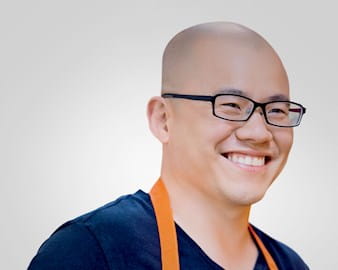
A life-changing year of travel inspired Daniel Tan, ’11 (AXP-10), to start a social enterprise with sizzle.
- By
- January 10, 2017
- Global

After earning his Executive MBA from Booth in 2011, Daniel Tan, ’11 (AXP-10), decided to take time off to recharge and rediscover his passion before returning to the corporate world. Family and friends advised against it, saying he should leverage his new degree for a promotion and pay raise.

But Tan stuck to his plan, and looking back, he has no regrets. “The entire year of slow travel in Latin America and Asia helped me discover so much about myself and the social causes I’m passionate about,” Tan said. “That eventually led me to quit the corporate world and become a social entrepreneur.”
During his travels, Tan realized he had reached his limit in visiting temples, museums, and other typical tourist destinations. He yearned for unique local experiences, and started taking cooking classes wherever he could.
“Singapore is an immigrant country. Chinese, Malaysian, Indian, and Eurasian: our cuisine is a blend of all of these. ”
“It was a good way to get to know a place,” Tan said. “The cooking-class teachers bring you to the markets. You get a crash course on local ingredients. It’s a complete cultural immersion.”
After his yearlong travel sabbatical, Tan returned home to Singapore. He hoped to continue his culinary-cultural education but couldn’t find any authentic cooking classes. “There are many cooking schools in Singapore,” he said. “But they all teach you how to cook French or Italian. I discovered this market need.”
Inspired, Tan set out to create a cooking school in his home country. But he threw in one extra key ingredient: his venture launched with a social mission. Food Playground, founded in 2012, does not hire trained chefs to teach its cooking classes. Tan discovered a segment of stay-at-home moms and female retirees who had extensive culinary knowledge, but no avenue to share it. Often, many of these women had left corporate jobs to care for their families and were seeking a way to re-enter the work world. Tan reached out to that talent pool and amassed a team of moms and active seniors to lead the cooking sessions at Food Playground, where the women mix compelling storytelling and practical kitchen know-how.
Food Playground navigates Singapore’s tight labor shortage by hiring women who technically aren’t even part of the workforce. Cooking-class students get to hear authentic stories about Singapore’s rich food history directly from sources who have grown up enjoying and creating the cuisine. For employees who stepped out of the workforce but hoped to come back, Food Playground’s flexible work schedules and engaging environment provide a bridge. Tan has seen several of his instructors return to corporate life. “The whole idea is we really want to provide more flexible employment for women who need that flexibility,” Tan said. While Tan has yet to hire a stay-at-home dad or male retiree, he would if the opportunity arose.
In the next five years, Tan doesn’t want to build an empire of cooking schools around the globe. Instead, he hopes to inspire more companies to see the benefits of flexible work and be agents of change in finding creative solutions to roadblocks people face when attempting to return to the workforce. For instance, Tan designed class times around his employees’ preferred hours, scheduling mid-morning and early afternoon sessions for those who have children in school.
Hands-on classes last a half day at Food Playground. Students cook three complete dishes from an ever-changing menu in the teaching kitchen. “Singapore’s food reflects our multiracial culture,” Tan said. “Singapore is an immigrant country. Chinese, Malaysian, Indian, and Eurasian: our cuisine is a blend of all of these. A lot of the food you find in Singapore, you can’t find anywhere else.”
As he faced obstacles to starting his business, Tan leaned heavily on his Booth background. “When we started, we wanted to apply for government grants,” Tan said. “But nobody believed in our idea, that somebody would pay a premium to learn from amateur cooks. It’s an unconventional business. My Booth education drilled inside my head a disciplined way of thinking and problem solving, which enabled me to overcome the many setbacks and surprises that came with starting Food Playground.”


The pharma executive at Pfizer is serious about changing lives and fostering new breakthroughs.
The Book of Booth: Andy Schmeltz, ’97
Mo Bhasin, ’15, pushes himself to the limits with the exhilarating sport of kiteboarding.
Booth 101 Kiteboarding
We asked three Booth experts: a former NFL player, a professor researching goal-setting, and a student reviving Booth's women's rugby club.
What Can Sports Teach Us about a Leadership Mind-set?